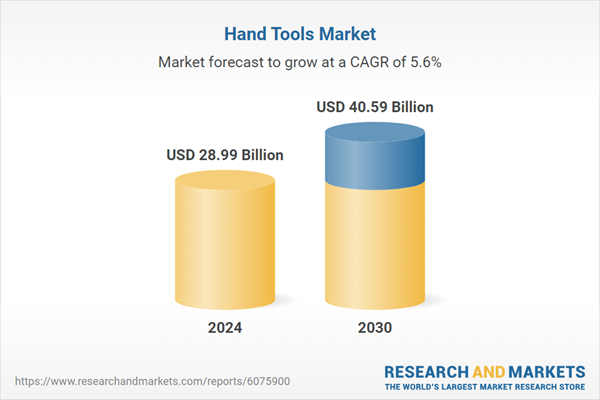Speak directly to the analyst to clarify any post sales queries you may have.
10% Free customizationThis report comes with 10% free customization, enabling you to add data that meets your specific business needs.
Increasing infrastructure activities in emerging markets are driving the need for construction-grade tools, while growing interest in DIY home improvement - particularly in North America and Europe - is contributing to market expansion. As urbanization accelerates and renovation trends continue, there is rising demand for ergonomic, durable, and multi-use tools designed for efficiency and comfort. In parallel, the aging global vehicle fleet and rising popularity of car modifications are supporting demand from the automotive repair segment. The need for durable, performance-tested tools in industrial environments is also prompting investment in innovation, with manufacturers focusing on advanced grip features, modular designs, and lightweight composite materials.
Key Market Drivers
Infrastructure Development and Urbanization
A core growth driver for the hand tools market is the global expansion of infrastructure projects and rapid urbanization. Construction projects require a wide range of hand tools - such as measuring tapes, hammers, chisels, and wrenches - for every phase of development. According to the United Nations, 68% of the world’s population will reside in urban areas by 2050, up from 56% in 2020. This shift is especially pronounced in Asia and Africa, where demand for housing, commercial buildings, and public infrastructure is rising. Initiatives such as India’s “Smart Cities Mission” and China’s Belt and Road Initiative underscore the massive tool requirements for modern infrastructure. These developments are not only driving the volume of hand tools needed but also encouraging design enhancements to meet the evolving demands of compact and specialized construction environments.Key Market Challenges
Rising Raw Material Costs
One of the major challenges for the global hand tools market is the volatility in raw material prices, particularly for steel, aluminum, and plastics. These materials are essential for manufacturing tools like screwdrivers, hammers, and pliers. From 2020 to 2022, steel prices surged by over 60%, primarily due to supply disruptions, energy inflation, and geopolitical instability, notably in regions such as Eastern Europe and Asia. This has significantly increased production costs and reduced profit margins.Smaller players, in particular, find it difficult to absorb these cost fluctuations or negotiate favorable long-term supply contracts. Many manufacturers have had to raise prices, which impacts affordability in developing regions such as Southeast Asia, Africa, and Latin America. In addition, the imposition of environmental regulations and carbon taxes has further increased sourcing costs. Navigating raw material price instability while maintaining product quality and affordability has become a key operational hurdle for companies in the hand tools sector.
Key Market Trends
Rising Demand for Multi-Functional and Compact Tools
A growing trend in the hand tools market is the increasing consumer and professional preference for compact, multi-functional tools. These tools combine several functions into a single unit, making them ideal for users who prioritize portability and efficient storage. Industries such as construction, defense, and automotive - as well as outdoor enthusiasts - are driving this shift.Tools like foldable pliers, modular screwdrivers, and ratcheting sets with interchangeable heads are gaining traction. The trend is also linked to the rise in urban living and limited storage space, especially in apartments and smaller homes. Between 2020 and 2024, compact multi-use tool sales increased by over 30%, particularly in North America and Europe. In response, manufacturers are introducing sleek, modern designs that cater to both function and style, appealing to a new generation of DIY users and professionals who seek tools that are as practical as they are visually appealing.
Key Market Players
- Stanley Black & Decker
- Snap-on Incorporated
- Apex Tool Group
- Makita Corporation
- Klein Tools
- Knipex
- Wera Tools
- Wiha Tools
- Gedore
- Bahco
Report Scope:
In this report, the Global Hand Tools Market has been segmented into the following categories, in addition to the industry trends which have also been detailed below:Hand Tools Market, By Type:
- Pliers
- Wrenches
- Hammers & Mallets
- Screwdrivers
- Cutting Tools
- Measuring Tools
- Others
Hand Tools Market, By Application:
- Construction
- Automotive
- Industrial Manufacturing
- Home & Garden
- Others
Hand Tools Market, By Distribution Channel:
- Online Retail
- Offline Retail
- Distributors
Hand Tools Market, By Region:
- North America
- United States
- Canada
- Mexico
- Europe
- Germany
- France
- United Kingdom
- Italy
- Spain
- South America
- Brazil
- Argentina
- Colombia
- Asia-Pacific
- China
- India
- Japan
- South Korea
- Australia
- Middle East & Africa
- Saudi Arabia
- UAE
- South Africa
Competitive Landscape
Company Profiles: Detailed analysis of the major companies present in the Global Hand Tools Market.Available Customizations:
With the given market data, the publisher offers customizations according to a company's specific needs. The following customization options are available for the report.Company Information
- Detailed analysis and profiling of additional market players (up to five).
This product will be delivered within 1-3 business days.
Table of Contents
Companies Mentioned
- Stanley Black & Decker
- Snap-on Incorporated
- Apex Tool Group
- Makita Corporation
- Klein Tools
- Knipex
- Wera Tools
- Wiha Tools
- Gedore
- Bahco
Table Information
| Report Attribute | Details |
|---|---|
| No. of Pages | 186 |
| Published | April 2025 |
| Forecast Period | 2024 - 2030 |
| Estimated Market Value ( USD | $ 28.99 Billion |
| Forecasted Market Value ( USD | $ 40.59 Billion |
| Compound Annual Growth Rate | 5.6% |
| Regions Covered | Global |
| No. of Companies Mentioned | 10 |









